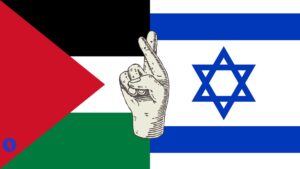In a normal week, Venezuela’s military going on high alert over claims of an enemy false flag operation might’ve made global headlines.
But much like episodes of Twin Peaks, each week now feels less normal than the last.
So join us on this wild journey.
Stay on top of your world from inside your inbox.
Subscribe for free today and receive way much more insights.
Trusted by 145,000+ subscribers
No spam. No noise. Unsubscribe any time.
It all started last Saturday, when Venezuela’s VP Delcy Rodríguez appeared on state TV:
“They thought and planned to attack this ExxonMobil platform in order to justify some kind of retaliation and action against Venezuela”, she alleged (her defence minister concurred).
Who’s they? “New evidence of this operation by ExxonMobil, Erik Prince, Machado, and Marco Rubio has reached our hands”, she claimed. For those in the back:
- Marco Rubio is of course the US secretary of state
- Erik Prince is the infamous founder of the ‘Blackwater’ mercenary group
- ExxonMobil is the US oil and gas giant drilling in waters administered by Guyana but claimed by Venezuela, and
- María Corina Machado is the popular opposition figure who should now be president of Venezuela, but President Maduro disqualified her then stole last year’s election from her successor.
So what’s Maduro’s allegation here? That they all plotted to send some Jack Reacher-esque hired guns to blow up the ExxonMobil rig as a way to trigger a war with Venezuela.
The broader context involves the classic toxic cocktail of contested turf and oil.
On the contested turf front, we’re talking about a jungle area the size of Florida known as Essequibo,which now makes up two-thirds of Guyana’s de-facto territory.
The centuries-old dispute had plodded along until a) Venezuela collapsed from 2013, and b) ExxonMobil announced historic oil and gas discoveries off Essequibo’s coast from 2015.
As Maduro’s approval ratings then tanked in Venezuela (and eight million folks fled), he started revving his claims back up over Essequibo, holding a 2023 referendum, then naming the region his 24th state last year, while beefing up his nearby military presence.
And now in 2025, Maduro has:
- Accused Guyana of a false flag attack in Feb (Guyana blamed Venezuelan gangs)
- Sailed a Venezuelan ship near an ExxonMobil rig, and
- Marco Rubio himself then appeared in Guyana, warning “it will be a very bad day for the Venezuelan regime if they were to attack Guyana or attack ExxonMobil”.
And that all leads us to two questions. First, are Maduro’s latest false flag claims plausible?
He’s offered no evidence, and has no credibility after years of repression and fraud. But given his full media control back home, it’s enough to just cite the shady histories of Erik Prince, Big Oil, and US intervention to distract his weary people from his own record.
But then the second question… who cares?
Beyond the humanitarian implications of Maduro’s continued reign, there’s also:
- 11 billion barrels of reasons to care courtesy of Essequibo’s oil and gas
- Those historic finds have been transformative for Guyana, one of the poorest countries in the Americas (its GDP has tripled since 2019), and there’s also…
- The prospect of a miscalculation between these two neighbours, risking the kind of direct cross-border conflict we haven’t seen in the region since the 1990s
So yeah, as wild as all this might appear, it’s worthy of our radar.
INTRIGUE’S TAKE
Venezuela’s military dwarfs the tiny Guyanese armed forces, but there are a couple of reasons why an actual military move still seems improbable: i) most of Essequibo is impenetrable (though less-so the offshore rigs), and ii) Maduro is deeply isolated in ways that reveal two things about diplomacy.
First, China has been relatively supportive of the Maduro regime, though has stayed notably quiet on this specific Essequibo issue. Why? Beijing owns a quarter of the vast ExxonMobil project.
Second, even Maduro’s long-time ally Cuba has stayed out of this, for equally intriguing reasons. Back in 1981, Fidel Castro himself openly sided with Guyana, which had its own sympathetic strongman at the time. And Castro then went on to provide decades of support in sectors like healthcare, even when Guyana changed directions.
So it’s a reminder that, sure, money talks (China), but so does history (Cuba).
Also worth noting:
- Venezuela and Guyana signed the Argyle Agreement in 2023, pledging a peaceful resolution to the territorial dispute.
- Guyana asked the International Court of Justice to intervene in March — it’s unlikely we’ll see a decision until next year at the earliest.





